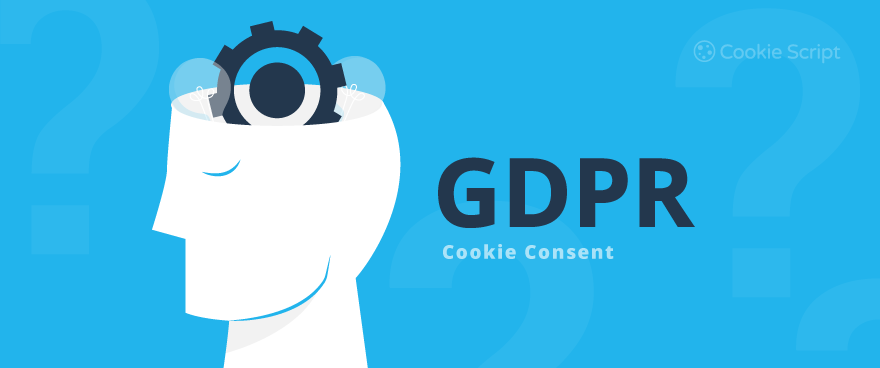ON THIS PAGE
In this article, CookieScript will go over the main aspects of keeping your website compliant. We also have several cookie compliance tools available that can help you stay on top of GDPR, CCPA, and other regulations.
Ensure your website cookies are GDPR compliant
Your website tracking technologies may be in line with past privacy directives, but have you updated your notification, consent, and record-keeping practices to ensure your cookies comply with the GDPR? Use this handy checklist to ensure your website's cookie policies are compliant with GDPR.
- Clear, concise information. Is your Cookie Policy vague or overly wordy? Use clear, direct language when explaining why you use cookies on your website and how this information is used, processed, and stored. This information is often described as an EU cookie disclaimer.
- Consent before processing. Cookies should be inactive by default on your website until the user consents to the cookie policy.
- Document each consent instance. Each time a user consents to the use of cookies, this should be documented and stored securely.
- Declining cookies should not be a barrier. A user's consent to cookies should not be a requirement of using the website's service or as part of a user contract.
- Consent should be separate from other transactions. Article 7 of the GDPR states that: "If the data subject’s consent is given in the context of a written declaration which also concerns other matters, the request for consent shall be presented in a manner which is clearly distinguishable from the other matters."
What this means is that consent to cookies collection and usage should not appear to be tied to other transactions. You should not imply that a user’s consent will improve the quality of products or services offered.
Cookie Consent Tool: Organize Your Consents
CookieScript has a Cookie Consent tool that makes it easy to record visitors' cookie consents. This feature helps website administrators remain compliant with the consent recording provisions of the CCPA and GDPR. Enabling this feature is easy.
To start a log of visitor cookie consents, simply check the "Record user consents" option in your settings. You can download and view your consent log at any time. Simply choose a date range for the cookie consents you would like to view and the tool will give you the option to download a .zip file of the selected range. Unzip the file and open the .csv file(s) in a program such as Microsoft Excel, OpenOffice Calc, Apple Numbers, or Google Docs. You can see exactly what is included in the downloaded CSV files.
Cookie Scanner: See What’s Running on Your Website
The average website runs approximately 20 cookies. But, if you operate your website for commercial purposes, chances are that you could have third-party cookies running that you are completely unaware of. If you don’t know what cookies are running on your website it can be difficult to follow every cookie law. Cookie Scanner is a website scanner that documents the cookies running on your website — even those often-missed JavaScript cookies. This tool even works like a cookie analyzer, allowing you to remove or modify unnecessary cookies.
Frequently asked questions
How can I tell if my website uses cookies?
It’s common for businesses not to know if their website uses cookies, or what those cookies are. Running a Cookie Scanner on your computer can help you to understand what Third-Party Cookies may be present.
How can I tell if my website’s cookies are GDPR compliant?
To make sure the cookies on your site are GDPR compliant, it’s important to update notification, consent, and record-keeping practices. It’s important to do things like check the wording on your Cookie Policy, leave cookies inactive until users provide consent, document each consent, and make sure that consent isn’t a barrier to the page content.
Does my website need to be GDPR compliant?
Any business or entity which collects or processes personal data from residents of the European Union is required to be compliant with the GDPR. This can also include companies based outside the EU that do business with EU residents. If you do business with European customers, then no matter your location, you will need to comply.
Does Google Consent Mode help with GDPR compliance?
If you are running Google Analytics for website tracking, your website won’t be GDPR compliant by default. Running Google Consent Mode with cookie tracking software can help you to maintain compliance with GDPR or other privacy regulations.
What does a Cookie Scanner do?
If you operate your website for commercial purposes, it may contain Third-Party Cookies that you are unaware of. A Cookie Scanner, such as CookieScript, will help you to remain aware of what cookies are operating behind the scenes so that you can remain in continual compliance. A Cookie Scanner also provides some level of control, allowing you to remove unwanted cookies.
What is a Cookie Consent tool?
Simply put, a cookie consent tool, such as CookieScript, can be used to organize incoming user consents into a manageable database. You can download or view the consent log at any time to make sure that the information users receive from you is within compliance.
